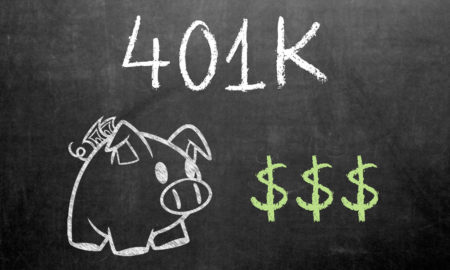

Waiting to invest can mean missing out on years of compound interest growth. In fact, waiting 10 years to get started can mean the difference between retiring with $500,000 and more than $1 million.
So when you have extra money in your budget, is it smarter to make bigger payments on your student loans or invest it? Here are some things to keep in mind as you make this decision.
Should You Pay off Student Loans or Invest: First ask, What’s the interest rate?
The first thing to compare is your interest rate(s) and possible rate of return.
You might have heard that paying off your debt gives you a guaranteed rate of return. Pay off the credit card that charges you 15% APR, for example, and it’s like getting an annual return of 15%.
Things are a little different when you look at lower-interest student loans; you might only be seeing a guaranteed “return” of 5%, depending on your interest rate.
How does that compare to the returns you could see on the stock market? Historically, the average annual return of the S&P 500 index has been about 10%. However, it’s incorrect to assume that you will see those types of returns each year.
Some years, you might see super-charged returns. (As of this writing, the S&P 500 has seen a 13.72% gain over a period of a year.) At other times, you will see losses; think of 2009, when stocks plummeted following the 2008 financial crisis.
Inflation also makes that 10% figure misleading. Consider your returns over 20 or 30 years: Your money has hopefully grown, but because of inflation, it’s worth a little less than it was when you first invested it. Once you account for this, your annualized return on stock investments may only be 6 or 7%.
No matter what you invest in, you won’t see steady, consistent returns every year. Instead, the focus should be on the cumulative growth of your investments over decades.
Lowering your interest rates makes investing more desirable
Deciding whether to pay off student loans or invest is all about balance. If you have student loans with low interest, you could likely see better returns by investing your spare cash.
One way to lower your interest rate is to refinance. When you refinance student loans, you take out a new loan with a different lender, which pays off your old loan (or loans). This debt will come with a new (and hopefully lower) interest rate and different repayment terms.
Refinancing could reduce how much you end up paying in interest while freeing up a little more in your budget for investing. With a much lower interest rate, you get even more value out of your investment dollars.
Keep in mind that refinancing is usually only a good choice if you have solid credit, a steady income, and can reasonably afford your payments. That’s because refinancing federal loans means forfeiting government protections such as income-driven repayment plans, deferment/forbearance, and some debt forgiveness programs. So only consider refinancing if you know you won’t need to rely on those federal programs and/or you’re refinancing private loans.
Editor’s note: If you’re thinking about refinancing your federal or private loan, its definitely worth taking a couple minutes to submit a refinancing application with SoFi. They have pretty strict lending criteria so not everyone can get approved, but the average member that does get approved for refinancing with SoFi saves an average of $22,359 on their total student loan payments (an average of $288 per month). You can see what rates you’re eligible for here.
Don’t forget the tax advantages
High-interest debt with no tax benefit (such as credit card debt) should be paid off as quickly as you can manage. But some types of debt, including student loans, come with a tax deduction. If you can claim a tax deduction for the interest you pay on your debt, it’s even less expensive — and the value of investing is even greater.
You can also get a tax benefit by investing. When you invest in tax-advantaged retirement accounts such as 401(k)s and IRAs, you get special benefits. This allows your money to grow more efficiently over time.
It’s possible to get a deduction for your student loan interest and your investment contributions. Both of these deductions can reduce your taxable income, lowering what you owe in taxes. However, your student loan interest tax deduction is capped at $2,500. The deduction also phases out as your income increases.
On the other hand, your 401(k) retirement contribution is fully tax deductible, no matter your income. This means that you can deduct the entire amount you contribute from your income.
By focusing on growing your retirement account rather than paying off student loan debt early, you can reap potentially bigger benefits.
Say you have an extra $300 a month. By putting it in a 401(k), you reduce your taxable income by $3,600 for the year. Plus, you have the potential to see significant gains over time. If you pay down your student loan debt, you might save a little bit in interest and shorten your debt repayment period, but you miss out on investment gains.
Should You Pay off Student Loans or Invest: Can you stomach the debt?
For some borrowers, choosing to invest while also paying down their student loans is a simple decision. They take comfort in the fact that they’re saving for their future now, instead of putting it off.
Others, though, have a much harder time with the concept of debt. Sometimes, it’s not the sheer numbers that matter — take your comfort level into consideration. If you lose sleep over the fact that you still have student loan debt hanging over you, it may make sense to focus solely on your debt for now.
The bottom line is that you will do better in the long run if you start investing as early as possible. Pay off the high-interest debt, then start investing while you tackle the low-interest, tax-deductible debt.
Photo credit: InvestmentZen Images – Creative Commons Attribution License
















3 Comments